Analysing Organisational Behaviour at BBC: A Detailed Report
VerifiedAdded on 2023/01/13
|20
|5708
|74
Report
AI Summary
This report provides a comprehensive analysis of organisational behaviour at the BBC, a prominent political and cultural institution. It examines the influence of organisational culture, politics, and power on employee behaviour and performance, using Handy's cultural typology and exploring the impact of reward, coercive, legitimate, and expert power. The report further delves into motivation theories, including Maslow's Hierarchy of Needs and McGregor's X and Y theory, to understand how content and process theories are used to achieve organisational goals. Additionally, it explores the factors that contribute to effective and ineffective teams, analysing relevant team and group development theories. The report concludes with an evaluation of key concepts and philosophies related to organisational behaviour, providing valuable insights into the BBC's operational dynamics and management strategies. This assignment is perfect for students studying organisational behavior and leadership management.
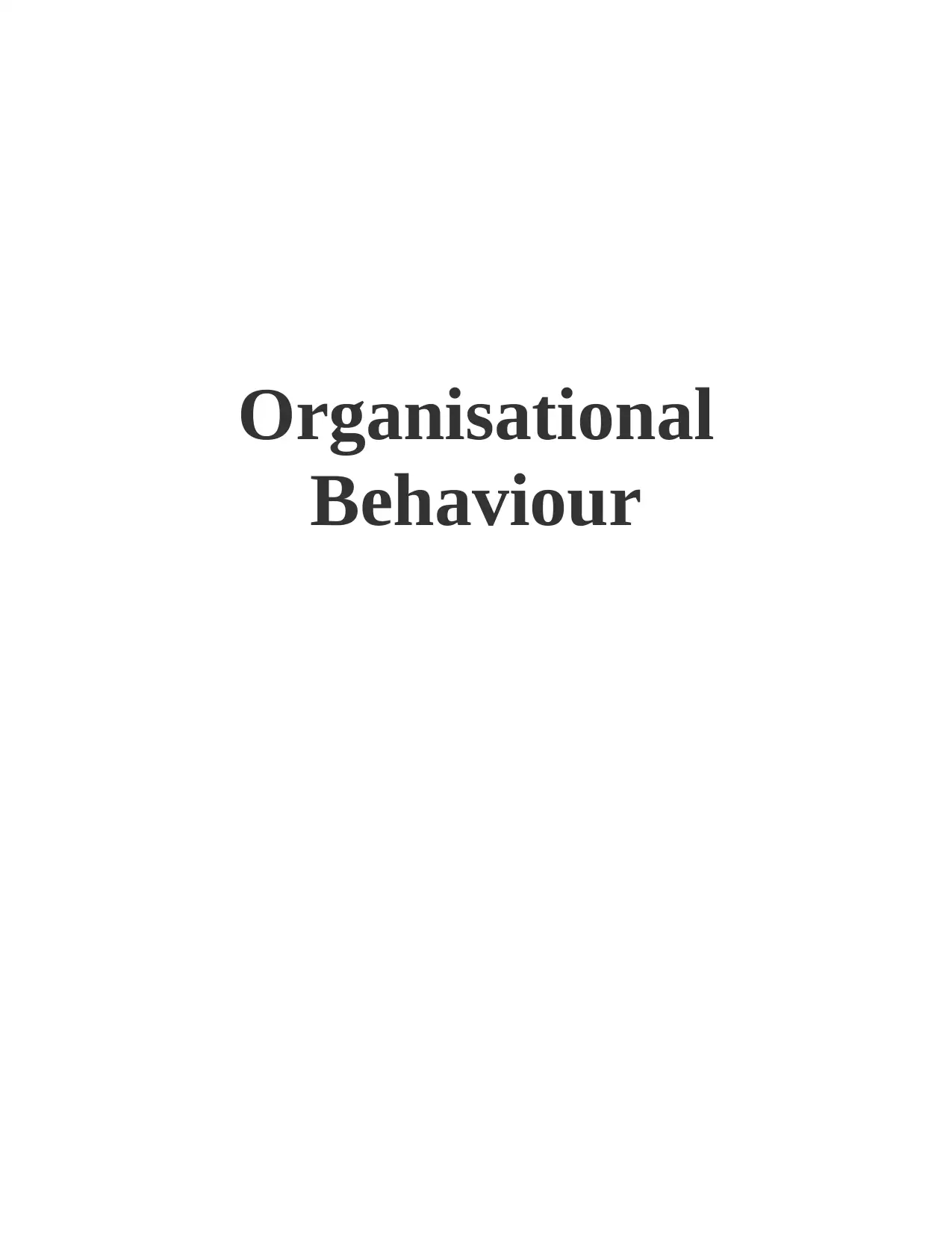
Organisational
Behaviour
Behaviour
Paraphrase This Document
Need a fresh take? Get an instant paraphrase of this document with our AI Paraphraser
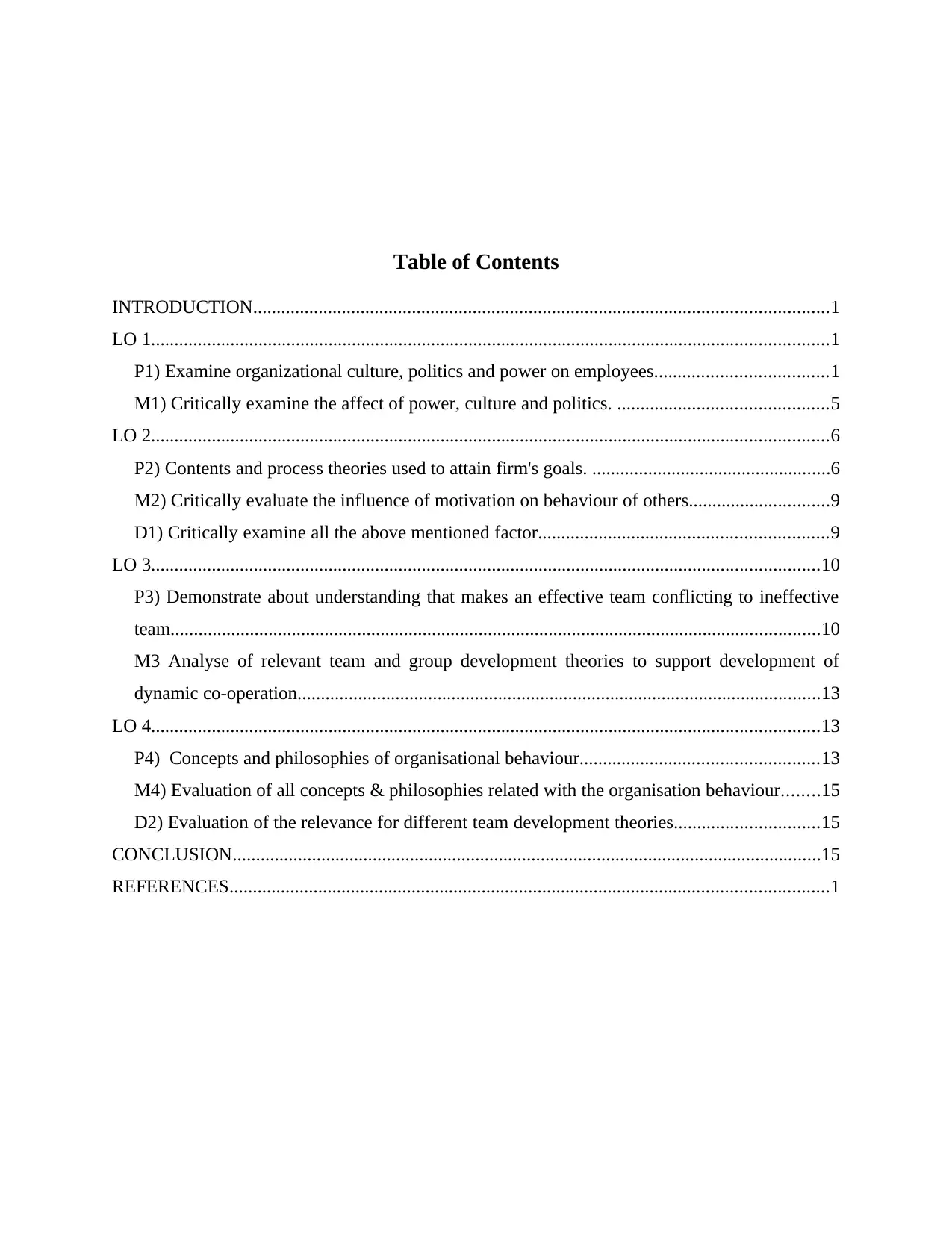
Table of Contents
INTRODUCTION...........................................................................................................................1
LO 1.................................................................................................................................................1
P1) Examine organizational culture, politics and power on employees.....................................1
M1) Critically examine the affect of power, culture and politics. .............................................5
LO 2.................................................................................................................................................6
P2) Contents and process theories used to attain firm's goals. ...................................................6
M2) Critically evaluate the influence of motivation on behaviour of others..............................9
D1) Critically examine all the above mentioned factor..............................................................9
LO 3...............................................................................................................................................10
P3) Demonstrate about understanding that makes an effective team conflicting to ineffective
team...........................................................................................................................................10
M3 Analyse of relevant team and group development theories to support development of
dynamic co-operation................................................................................................................13
LO 4...............................................................................................................................................13
P4) Concepts and philosophies of organisational behaviour...................................................13
M4) Evaluation of all concepts & philosophies related with the organisation behaviour........15
D2) Evaluation of the relevance for different team development theories...............................15
CONCLUSION..............................................................................................................................15
REFERENCES................................................................................................................................1
INTRODUCTION...........................................................................................................................1
LO 1.................................................................................................................................................1
P1) Examine organizational culture, politics and power on employees.....................................1
M1) Critically examine the affect of power, culture and politics. .............................................5
LO 2.................................................................................................................................................6
P2) Contents and process theories used to attain firm's goals. ...................................................6
M2) Critically evaluate the influence of motivation on behaviour of others..............................9
D1) Critically examine all the above mentioned factor..............................................................9
LO 3...............................................................................................................................................10
P3) Demonstrate about understanding that makes an effective team conflicting to ineffective
team...........................................................................................................................................10
M3 Analyse of relevant team and group development theories to support development of
dynamic co-operation................................................................................................................13
LO 4...............................................................................................................................................13
P4) Concepts and philosophies of organisational behaviour...................................................13
M4) Evaluation of all concepts & philosophies related with the organisation behaviour........15
D2) Evaluation of the relevance for different team development theories...............................15
CONCLUSION..............................................................................................................................15
REFERENCES................................................................................................................................1

⊘ This is a preview!⊘
Do you want full access?
Subscribe today to unlock all pages.

Trusted by 1+ million students worldwide
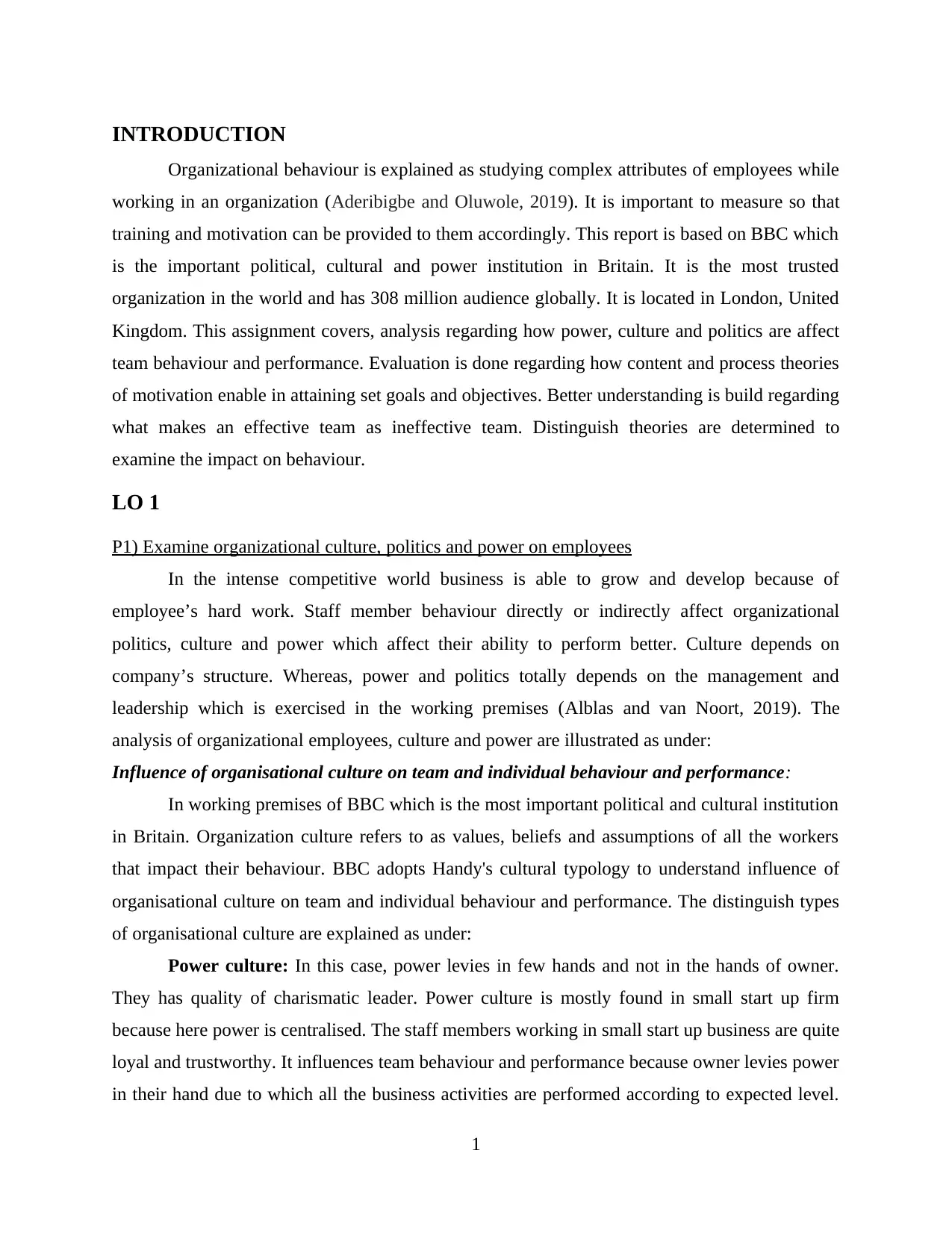
INTRODUCTION
Organizational behaviour is explained as studying complex attributes of employees while
working in an organization (Aderibigbe and Oluwole, 2019). It is important to measure so that
training and motivation can be provided to them accordingly. This report is based on BBC which
is the important political, cultural and power institution in Britain. It is the most trusted
organization in the world and has 308 million audience globally. It is located in London, United
Kingdom. This assignment covers, analysis regarding how power, culture and politics are affect
team behaviour and performance. Evaluation is done regarding how content and process theories
of motivation enable in attaining set goals and objectives. Better understanding is build regarding
what makes an effective team as ineffective team. Distinguish theories are determined to
examine the impact on behaviour.
LO 1
P1) Examine organizational culture, politics and power on employees
In the intense competitive world business is able to grow and develop because of
employee’s hard work. Staff member behaviour directly or indirectly affect organizational
politics, culture and power which affect their ability to perform better. Culture depends on
company’s structure. Whereas, power and politics totally depends on the management and
leadership which is exercised in the working premises (Alblas and van Noort, 2019). The
analysis of organizational employees, culture and power are illustrated as under:
Influence of organisational culture on team and individual behaviour and performance:
In working premises of BBC which is the most important political and cultural institution
in Britain. Organization culture refers to as values, beliefs and assumptions of all the workers
that impact their behaviour. BBC adopts Handy's cultural typology to understand influence of
organisational culture on team and individual behaviour and performance. The distinguish types
of organisational culture are explained as under:
Power culture: In this case, power levies in few hands and not in the hands of owner.
They has quality of charismatic leader. Power culture is mostly found in small start up firm
because here power is centralised. The staff members working in small start up business are quite
loyal and trustworthy. It influences team behaviour and performance because owner levies power
in their hand due to which all the business activities are performed according to expected level.
1
Organizational behaviour is explained as studying complex attributes of employees while
working in an organization (Aderibigbe and Oluwole, 2019). It is important to measure so that
training and motivation can be provided to them accordingly. This report is based on BBC which
is the important political, cultural and power institution in Britain. It is the most trusted
organization in the world and has 308 million audience globally. It is located in London, United
Kingdom. This assignment covers, analysis regarding how power, culture and politics are affect
team behaviour and performance. Evaluation is done regarding how content and process theories
of motivation enable in attaining set goals and objectives. Better understanding is build regarding
what makes an effective team as ineffective team. Distinguish theories are determined to
examine the impact on behaviour.
LO 1
P1) Examine organizational culture, politics and power on employees
In the intense competitive world business is able to grow and develop because of
employee’s hard work. Staff member behaviour directly or indirectly affect organizational
politics, culture and power which affect their ability to perform better. Culture depends on
company’s structure. Whereas, power and politics totally depends on the management and
leadership which is exercised in the working premises (Alblas and van Noort, 2019). The
analysis of organizational employees, culture and power are illustrated as under:
Influence of organisational culture on team and individual behaviour and performance:
In working premises of BBC which is the most important political and cultural institution
in Britain. Organization culture refers to as values, beliefs and assumptions of all the workers
that impact their behaviour. BBC adopts Handy's cultural typology to understand influence of
organisational culture on team and individual behaviour and performance. The distinguish types
of organisational culture are explained as under:
Power culture: In this case, power levies in few hands and not in the hands of owner.
They has quality of charismatic leader. Power culture is mostly found in small start up firm
because here power is centralised. The staff members working in small start up business are quite
loyal and trustworthy. It influences team behaviour and performance because owner levies power
in their hand due to which all the business activities are performed according to expected level.
1
Paraphrase This Document
Need a fresh take? Get an instant paraphrase of this document with our AI Paraphraser
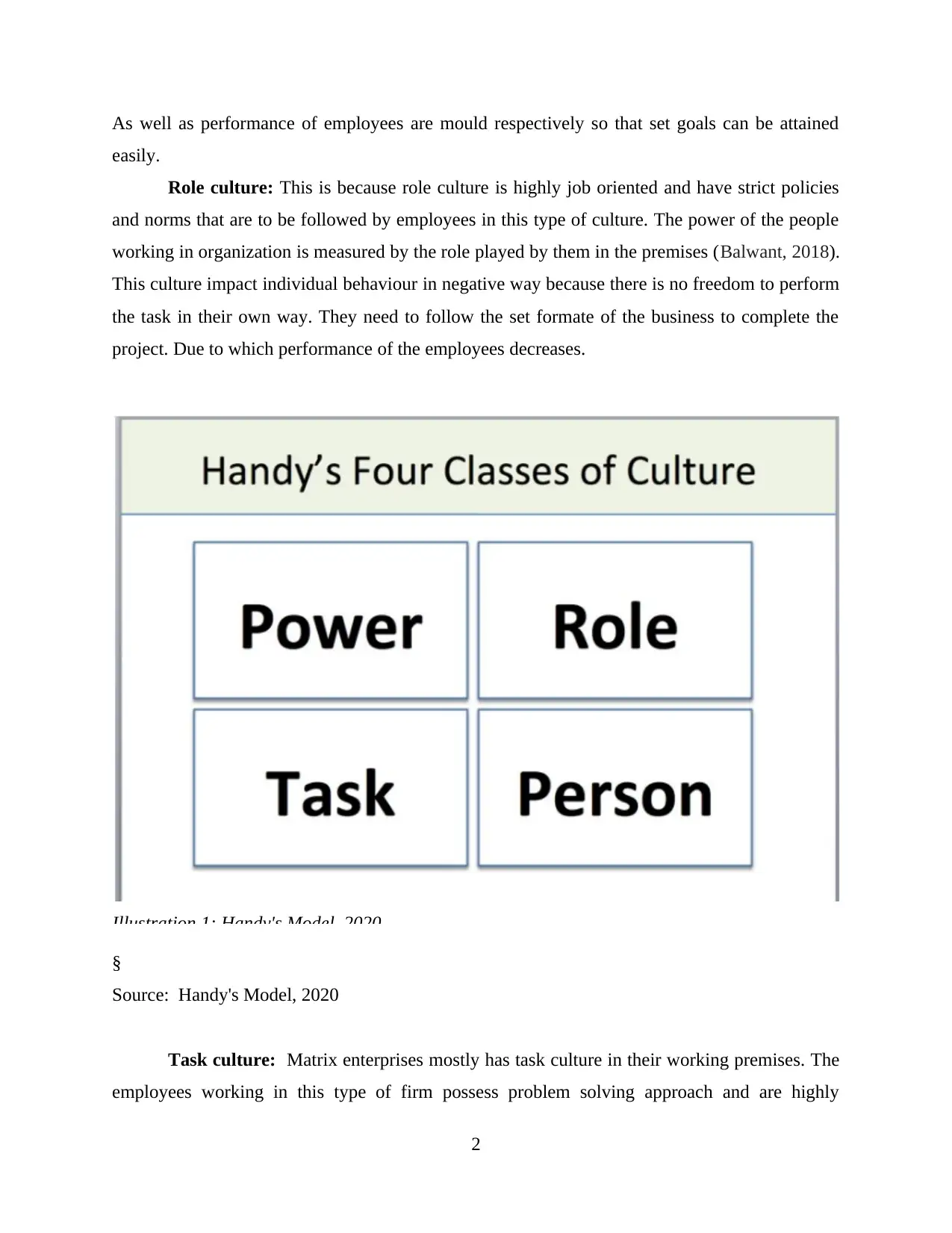
As well as performance of employees are mould respectively so that set goals can be attained
easily.
Role culture: This is because role culture is highly job oriented and have strict policies
and norms that are to be followed by employees in this type of culture. The power of the people
working in organization is measured by the role played by them in the premises (Balwant, 2018).
This culture impact individual behaviour in negative way because there is no freedom to perform
the task in their own way. They need to follow the set formate of the business to complete the
project. Due to which performance of the employees decreases.
Illustration 1: Handy's Model, 2020
§
Source: Handy's Model, 2020
Task culture: Matrix enterprises mostly has task culture in their working premises. The
employees working in this type of firm possess problem solving approach and are highly
2
easily.
Role culture: This is because role culture is highly job oriented and have strict policies
and norms that are to be followed by employees in this type of culture. The power of the people
working in organization is measured by the role played by them in the premises (Balwant, 2018).
This culture impact individual behaviour in negative way because there is no freedom to perform
the task in their own way. They need to follow the set formate of the business to complete the
project. Due to which performance of the employees decreases.
Illustration 1: Handy's Model, 2020
§
Source: Handy's Model, 2020
Task culture: Matrix enterprises mostly has task culture in their working premises. The
employees working in this type of firm possess problem solving approach and are highly
2
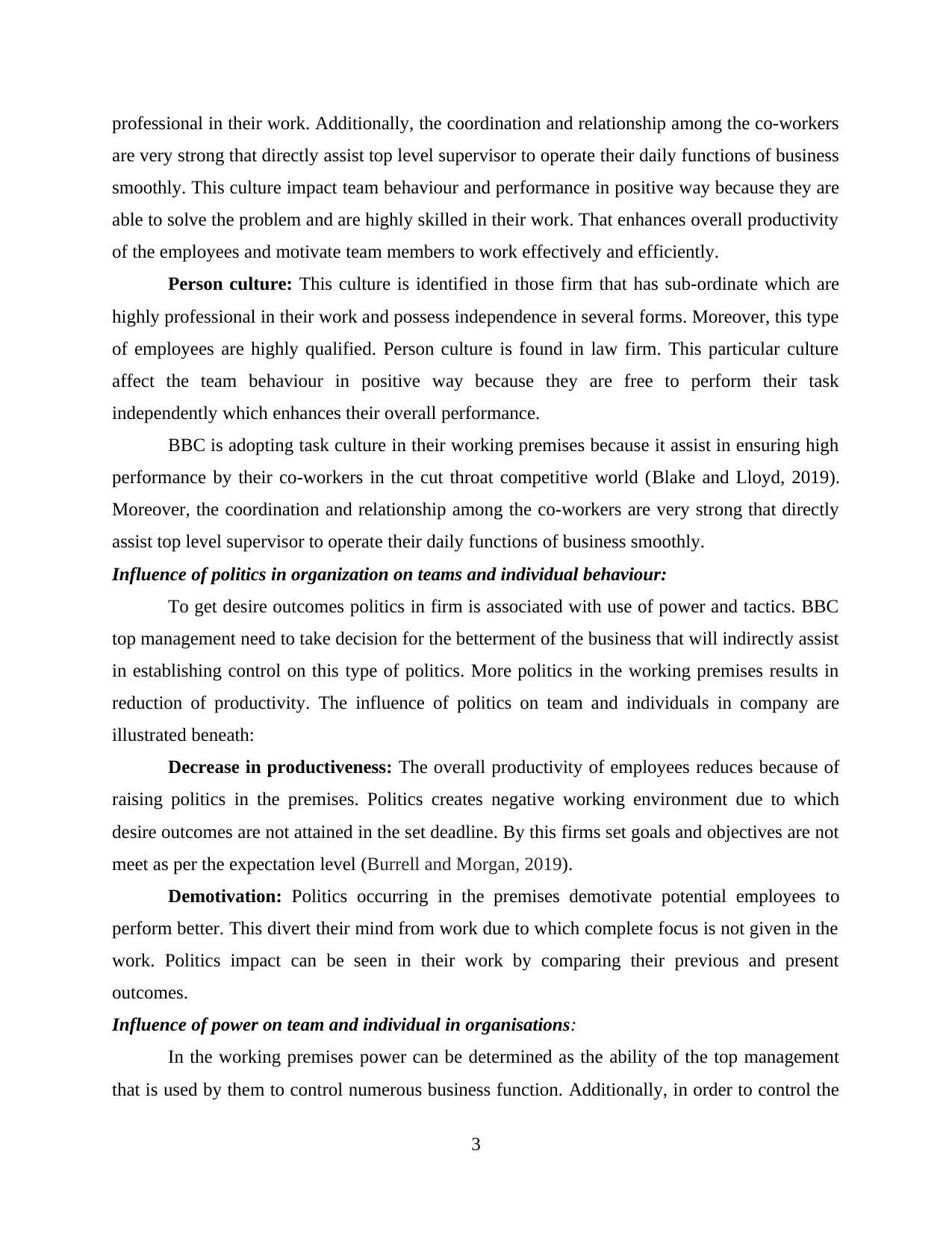
professional in their work. Additionally, the coordination and relationship among the co-workers
are very strong that directly assist top level supervisor to operate their daily functions of business
smoothly. This culture impact team behaviour and performance in positive way because they are
able to solve the problem and are highly skilled in their work. That enhances overall productivity
of the employees and motivate team members to work effectively and efficiently.
Person culture: This culture is identified in those firm that has sub-ordinate which are
highly professional in their work and possess independence in several forms. Moreover, this type
of employees are highly qualified. Person culture is found in law firm. This particular culture
affect the team behaviour in positive way because they are free to perform their task
independently which enhances their overall performance.
BBC is adopting task culture in their working premises because it assist in ensuring high
performance by their co-workers in the cut throat competitive world (Blake and Lloyd, 2019).
Moreover, the coordination and relationship among the co-workers are very strong that directly
assist top level supervisor to operate their daily functions of business smoothly.
Influence of politics in organization on teams and individual behaviour:
To get desire outcomes politics in firm is associated with use of power and tactics. BBC
top management need to take decision for the betterment of the business that will indirectly assist
in establishing control on this type of politics. More politics in the working premises results in
reduction of productivity. The influence of politics on team and individuals in company are
illustrated beneath:
Decrease in productiveness: The overall productivity of employees reduces because of
raising politics in the premises. Politics creates negative working environment due to which
desire outcomes are not attained in the set deadline. By this firms set goals and objectives are not
meet as per the expectation level (Burrell and Morgan, 2019).
Demotivation: Politics occurring in the premises demotivate potential employees to
perform better. This divert their mind from work due to which complete focus is not given in the
work. Politics impact can be seen in their work by comparing their previous and present
outcomes.
Influence of power on team and individual in organisations:
In the working premises power can be determined as the ability of the top management
that is used by them to control numerous business function. Additionally, in order to control the
3
are very strong that directly assist top level supervisor to operate their daily functions of business
smoothly. This culture impact team behaviour and performance in positive way because they are
able to solve the problem and are highly skilled in their work. That enhances overall productivity
of the employees and motivate team members to work effectively and efficiently.
Person culture: This culture is identified in those firm that has sub-ordinate which are
highly professional in their work and possess independence in several forms. Moreover, this type
of employees are highly qualified. Person culture is found in law firm. This particular culture
affect the team behaviour in positive way because they are free to perform their task
independently which enhances their overall performance.
BBC is adopting task culture in their working premises because it assist in ensuring high
performance by their co-workers in the cut throat competitive world (Blake and Lloyd, 2019).
Moreover, the coordination and relationship among the co-workers are very strong that directly
assist top level supervisor to operate their daily functions of business smoothly.
Influence of politics in organization on teams and individual behaviour:
To get desire outcomes politics in firm is associated with use of power and tactics. BBC
top management need to take decision for the betterment of the business that will indirectly assist
in establishing control on this type of politics. More politics in the working premises results in
reduction of productivity. The influence of politics on team and individuals in company are
illustrated beneath:
Decrease in productiveness: The overall productivity of employees reduces because of
raising politics in the premises. Politics creates negative working environment due to which
desire outcomes are not attained in the set deadline. By this firms set goals and objectives are not
meet as per the expectation level (Burrell and Morgan, 2019).
Demotivation: Politics occurring in the premises demotivate potential employees to
perform better. This divert their mind from work due to which complete focus is not given in the
work. Politics impact can be seen in their work by comparing their previous and present
outcomes.
Influence of power on team and individual in organisations:
In the working premises power can be determined as the ability of the top management
that is used by them to control numerous business function. Additionally, in order to control the
3
⊘ This is a preview!⊘
Do you want full access?
Subscribe today to unlock all pages.

Trusted by 1+ million students worldwide
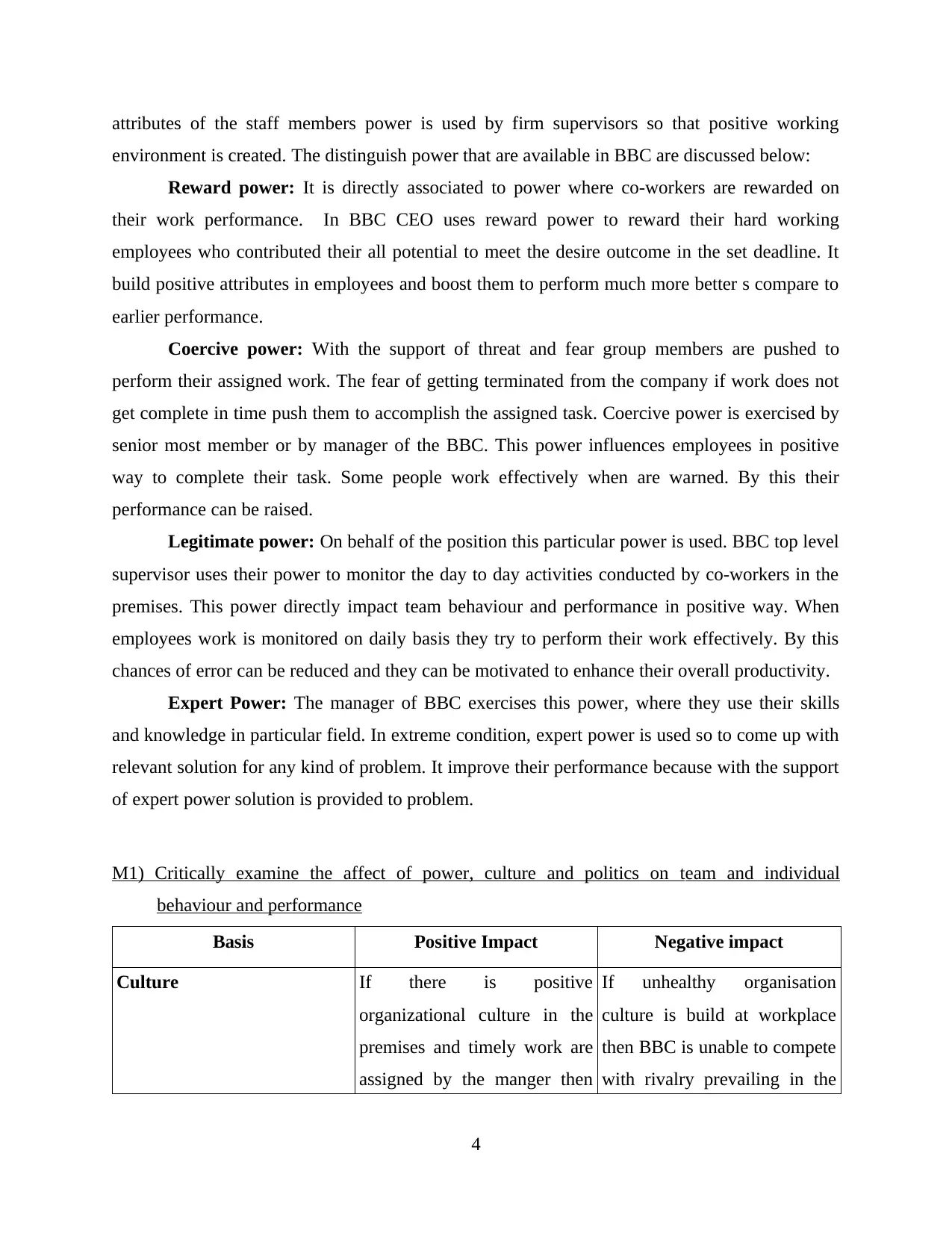
attributes of the staff members power is used by firm supervisors so that positive working
environment is created. The distinguish power that are available in BBC are discussed below:
Reward power: It is directly associated to power where co-workers are rewarded on
their work performance. In BBC CEO uses reward power to reward their hard working
employees who contributed their all potential to meet the desire outcome in the set deadline. It
build positive attributes in employees and boost them to perform much more better s compare to
earlier performance.
Coercive power: With the support of threat and fear group members are pushed to
perform their assigned work. The fear of getting terminated from the company if work does not
get complete in time push them to accomplish the assigned task. Coercive power is exercised by
senior most member or by manager of the BBC. This power influences employees in positive
way to complete their task. Some people work effectively when are warned. By this their
performance can be raised.
Legitimate power: On behalf of the position this particular power is used. BBC top level
supervisor uses their power to monitor the day to day activities conducted by co-workers in the
premises. This power directly impact team behaviour and performance in positive way. When
employees work is monitored on daily basis they try to perform their work effectively. By this
chances of error can be reduced and they can be motivated to enhance their overall productivity.
Expert Power: The manager of BBC exercises this power, where they use their skills
and knowledge in particular field. In extreme condition, expert power is used so to come up with
relevant solution for any kind of problem. It improve their performance because with the support
of expert power solution is provided to problem.
M1) Critically examine the affect of power, culture and politics on team and individual
behaviour and performance
Basis Positive Impact Negative impact
Culture If there is positive
organizational culture in the
premises and timely work are
assigned by the manger then
If unhealthy organisation
culture is build at workplace
then BBC is unable to compete
with rivalry prevailing in the
4
environment is created. The distinguish power that are available in BBC are discussed below:
Reward power: It is directly associated to power where co-workers are rewarded on
their work performance. In BBC CEO uses reward power to reward their hard working
employees who contributed their all potential to meet the desire outcome in the set deadline. It
build positive attributes in employees and boost them to perform much more better s compare to
earlier performance.
Coercive power: With the support of threat and fear group members are pushed to
perform their assigned work. The fear of getting terminated from the company if work does not
get complete in time push them to accomplish the assigned task. Coercive power is exercised by
senior most member or by manager of the BBC. This power influences employees in positive
way to complete their task. Some people work effectively when are warned. By this their
performance can be raised.
Legitimate power: On behalf of the position this particular power is used. BBC top level
supervisor uses their power to monitor the day to day activities conducted by co-workers in the
premises. This power directly impact team behaviour and performance in positive way. When
employees work is monitored on daily basis they try to perform their work effectively. By this
chances of error can be reduced and they can be motivated to enhance their overall productivity.
Expert Power: The manager of BBC exercises this power, where they use their skills
and knowledge in particular field. In extreme condition, expert power is used so to come up with
relevant solution for any kind of problem. It improve their performance because with the support
of expert power solution is provided to problem.
M1) Critically examine the affect of power, culture and politics on team and individual
behaviour and performance
Basis Positive Impact Negative impact
Culture If there is positive
organizational culture in the
premises and timely work are
assigned by the manger then
If unhealthy organisation
culture is build at workplace
then BBC is unable to compete
with rivalry prevailing in the
4
Paraphrase This Document
Need a fresh take? Get an instant paraphrase of this document with our AI Paraphraser
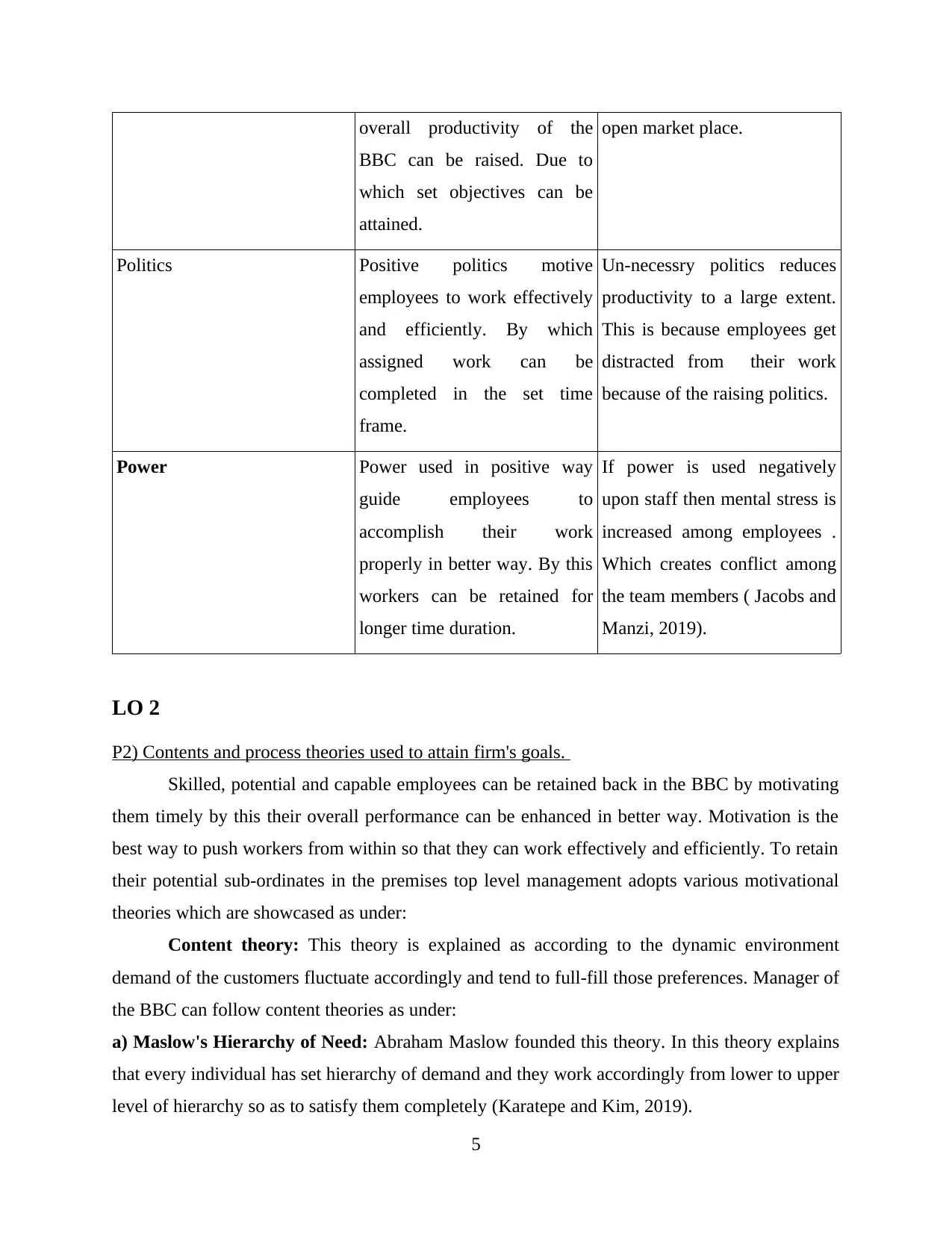
overall productivity of the
BBC can be raised. Due to
which set objectives can be
attained.
open market place.
Politics Positive politics motive
employees to work effectively
and efficiently. By which
assigned work can be
completed in the set time
frame.
Un-necessry politics reduces
productivity to a large extent.
This is because employees get
distracted from their work
because of the raising politics.
Power Power used in positive way
guide employees to
accomplish their work
properly in better way. By this
workers can be retained for
longer time duration.
If power is used negatively
upon staff then mental stress is
increased among employees .
Which creates conflict among
the team members ( Jacobs and
Manzi, 2019).
LO 2
P2) Contents and process theories used to attain firm's goals.
Skilled, potential and capable employees can be retained back in the BBC by motivating
them timely by this their overall performance can be enhanced in better way. Motivation is the
best way to push workers from within so that they can work effectively and efficiently. To retain
their potential sub-ordinates in the premises top level management adopts various motivational
theories which are showcased as under:
Content theory: This theory is explained as according to the dynamic environment
demand of the customers fluctuate accordingly and tend to full-fill those preferences. Manager of
the BBC can follow content theories as under:
a) Maslow's Hierarchy of Need: Abraham Maslow founded this theory. In this theory explains
that every individual has set hierarchy of demand and they work accordingly from lower to upper
level of hierarchy so as to satisfy them completely (Karatepe and Kim, 2019).
5
BBC can be raised. Due to
which set objectives can be
attained.
open market place.
Politics Positive politics motive
employees to work effectively
and efficiently. By which
assigned work can be
completed in the set time
frame.
Un-necessry politics reduces
productivity to a large extent.
This is because employees get
distracted from their work
because of the raising politics.
Power Power used in positive way
guide employees to
accomplish their work
properly in better way. By this
workers can be retained for
longer time duration.
If power is used negatively
upon staff then mental stress is
increased among employees .
Which creates conflict among
the team members ( Jacobs and
Manzi, 2019).
LO 2
P2) Contents and process theories used to attain firm's goals.
Skilled, potential and capable employees can be retained back in the BBC by motivating
them timely by this their overall performance can be enhanced in better way. Motivation is the
best way to push workers from within so that they can work effectively and efficiently. To retain
their potential sub-ordinates in the premises top level management adopts various motivational
theories which are showcased as under:
Content theory: This theory is explained as according to the dynamic environment
demand of the customers fluctuate accordingly and tend to full-fill those preferences. Manager of
the BBC can follow content theories as under:
a) Maslow's Hierarchy of Need: Abraham Maslow founded this theory. In this theory explains
that every individual has set hierarchy of demand and they work accordingly from lower to upper
level of hierarchy so as to satisfy them completely (Karatepe and Kim, 2019).
5
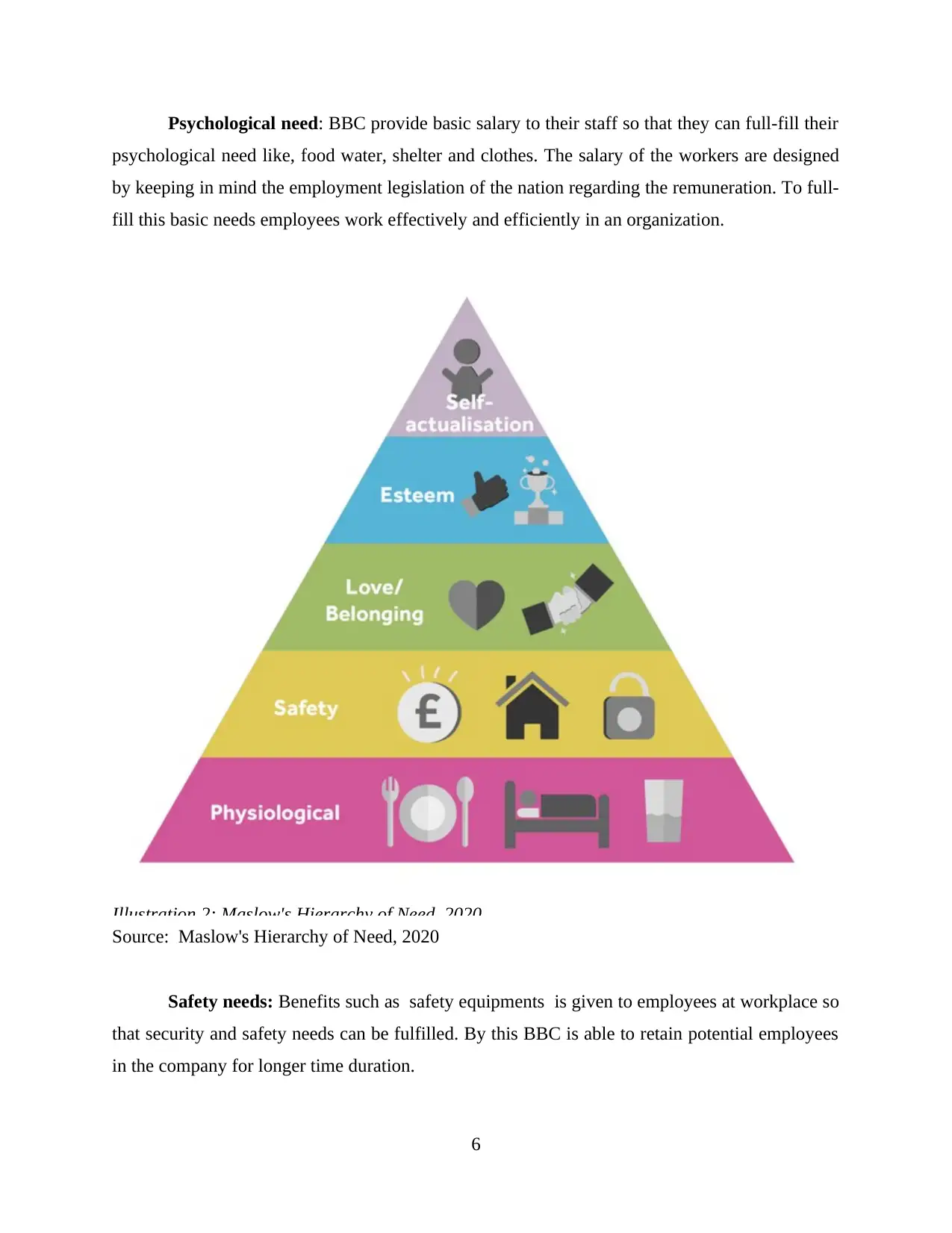
Psychological need: BBC provide basic salary to their staff so that they can full-fill their
psychological need like, food water, shelter and clothes. The salary of the workers are designed
by keeping in mind the employment legislation of the nation regarding the remuneration. To full-
fill this basic needs employees work effectively and efficiently in an organization.
Illustration 2: Maslow's Hierarchy of Need, 2020
Source: Maslow's Hierarchy of Need, 2020
Safety needs: Benefits such as safety equipments is given to employees at workplace so
that security and safety needs can be fulfilled. By this BBC is able to retain potential employees
in the company for longer time duration.
6
psychological need like, food water, shelter and clothes. The salary of the workers are designed
by keeping in mind the employment legislation of the nation regarding the remuneration. To full-
fill this basic needs employees work effectively and efficiently in an organization.
Illustration 2: Maslow's Hierarchy of Need, 2020
Source: Maslow's Hierarchy of Need, 2020
Safety needs: Benefits such as safety equipments is given to employees at workplace so
that security and safety needs can be fulfilled. By this BBC is able to retain potential employees
in the company for longer time duration.
6
⊘ This is a preview!⊘
Do you want full access?
Subscribe today to unlock all pages.

Trusted by 1+ million students worldwide
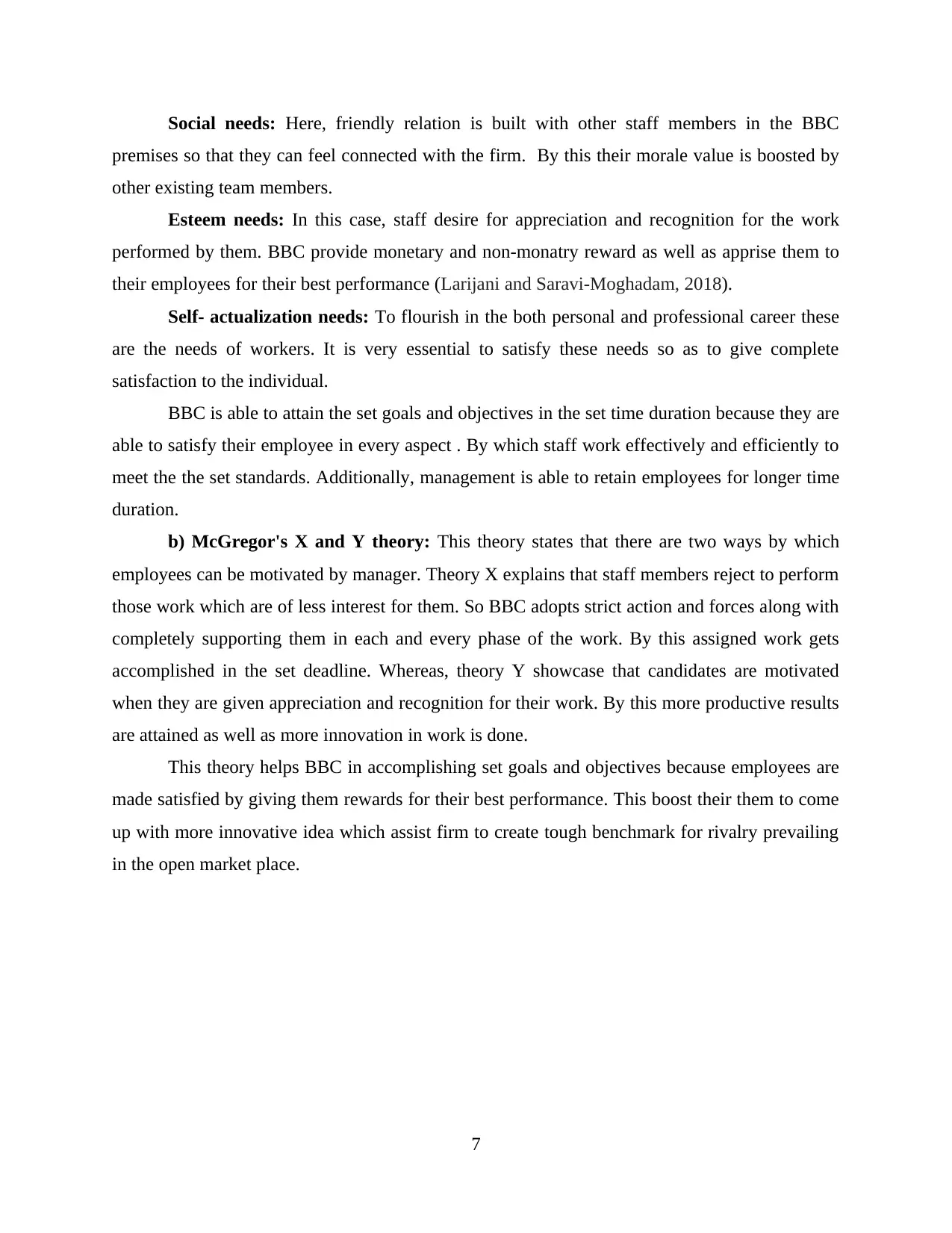
Social needs: Here, friendly relation is built with other staff members in the BBC
premises so that they can feel connected with the firm. By this their morale value is boosted by
other existing team members.
Esteem needs: In this case, staff desire for appreciation and recognition for the work
performed by them. BBC provide monetary and non-monatry reward as well as apprise them to
their employees for their best performance (Larijani and Saravi-Moghadam, 2018).
Self- actualization needs: To flourish in the both personal and professional career these
are the needs of workers. It is very essential to satisfy these needs so as to give complete
satisfaction to the individual.
BBC is able to attain the set goals and objectives in the set time duration because they are
able to satisfy their employee in every aspect . By which staff work effectively and efficiently to
meet the the set standards. Additionally, management is able to retain employees for longer time
duration.
b) McGregor's X and Y theory: This theory states that there are two ways by which
employees can be motivated by manager. Theory X explains that staff members reject to perform
those work which are of less interest for them. So BBC adopts strict action and forces along with
completely supporting them in each and every phase of the work. By this assigned work gets
accomplished in the set deadline. Whereas, theory Y showcase that candidates are motivated
when they are given appreciation and recognition for their work. By this more productive results
are attained as well as more innovation in work is done.
This theory helps BBC in accomplishing set goals and objectives because employees are
made satisfied by giving them rewards for their best performance. This boost their them to come
up with more innovative idea which assist firm to create tough benchmark for rivalry prevailing
in the open market place.
7
premises so that they can feel connected with the firm. By this their morale value is boosted by
other existing team members.
Esteem needs: In this case, staff desire for appreciation and recognition for the work
performed by them. BBC provide monetary and non-monatry reward as well as apprise them to
their employees for their best performance (Larijani and Saravi-Moghadam, 2018).
Self- actualization needs: To flourish in the both personal and professional career these
are the needs of workers. It is very essential to satisfy these needs so as to give complete
satisfaction to the individual.
BBC is able to attain the set goals and objectives in the set time duration because they are
able to satisfy their employee in every aspect . By which staff work effectively and efficiently to
meet the the set standards. Additionally, management is able to retain employees for longer time
duration.
b) McGregor's X and Y theory: This theory states that there are two ways by which
employees can be motivated by manager. Theory X explains that staff members reject to perform
those work which are of less interest for them. So BBC adopts strict action and forces along with
completely supporting them in each and every phase of the work. By this assigned work gets
accomplished in the set deadline. Whereas, theory Y showcase that candidates are motivated
when they are given appreciation and recognition for their work. By this more productive results
are attained as well as more innovation in work is done.
This theory helps BBC in accomplishing set goals and objectives because employees are
made satisfied by giving them rewards for their best performance. This boost their them to come
up with more innovative idea which assist firm to create tough benchmark for rivalry prevailing
in the open market place.
7
Paraphrase This Document
Need a fresh take? Get an instant paraphrase of this document with our AI Paraphraser
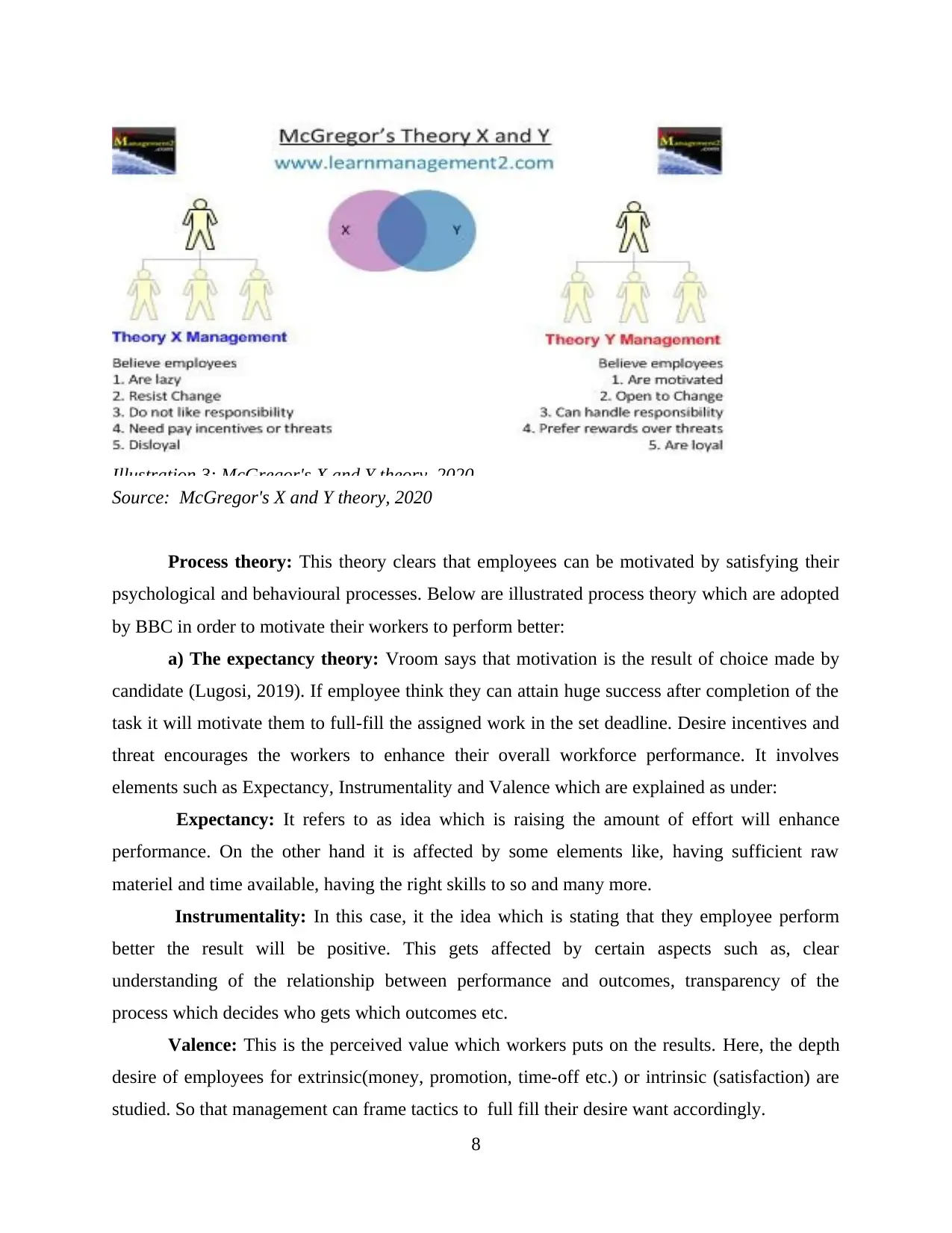
Illustration 3: McGregor's X and Y theory, 2020
Source: McGregor's X and Y theory, 2020
Process theory: This theory clears that employees can be motivated by satisfying their
psychological and behavioural processes. Below are illustrated process theory which are adopted
by BBC in order to motivate their workers to perform better:
a) The expectancy theory: Vroom says that motivation is the result of choice made by
candidate (Lugosi, 2019). If employee think they can attain huge success after completion of the
task it will motivate them to full-fill the assigned work in the set deadline. Desire incentives and
threat encourages the workers to enhance their overall workforce performance. It involves
elements such as Expectancy, Instrumentality and Valence which are explained as under:
Expectancy: It refers to as idea which is raising the amount of effort will enhance
performance. On the other hand it is affected by some elements like, having sufficient raw
materiel and time available, having the right skills to so and many more.
Instrumentality: In this case, it the idea which is stating that they employee perform
better the result will be positive. This gets affected by certain aspects such as, clear
understanding of the relationship between performance and outcomes, transparency of the
process which decides who gets which outcomes etc.
Valence: This is the perceived value which workers puts on the results. Here, the depth
desire of employees for extrinsic(money, promotion, time-off etc.) or intrinsic (satisfaction) are
studied. So that management can frame tactics to full fill their desire want accordingly.
8
Source: McGregor's X and Y theory, 2020
Process theory: This theory clears that employees can be motivated by satisfying their
psychological and behavioural processes. Below are illustrated process theory which are adopted
by BBC in order to motivate their workers to perform better:
a) The expectancy theory: Vroom says that motivation is the result of choice made by
candidate (Lugosi, 2019). If employee think they can attain huge success after completion of the
task it will motivate them to full-fill the assigned work in the set deadline. Desire incentives and
threat encourages the workers to enhance their overall workforce performance. It involves
elements such as Expectancy, Instrumentality and Valence which are explained as under:
Expectancy: It refers to as idea which is raising the amount of effort will enhance
performance. On the other hand it is affected by some elements like, having sufficient raw
materiel and time available, having the right skills to so and many more.
Instrumentality: In this case, it the idea which is stating that they employee perform
better the result will be positive. This gets affected by certain aspects such as, clear
understanding of the relationship between performance and outcomes, transparency of the
process which decides who gets which outcomes etc.
Valence: This is the perceived value which workers puts on the results. Here, the depth
desire of employees for extrinsic(money, promotion, time-off etc.) or intrinsic (satisfaction) are
studied. So that management can frame tactics to full fill their desire want accordingly.
8
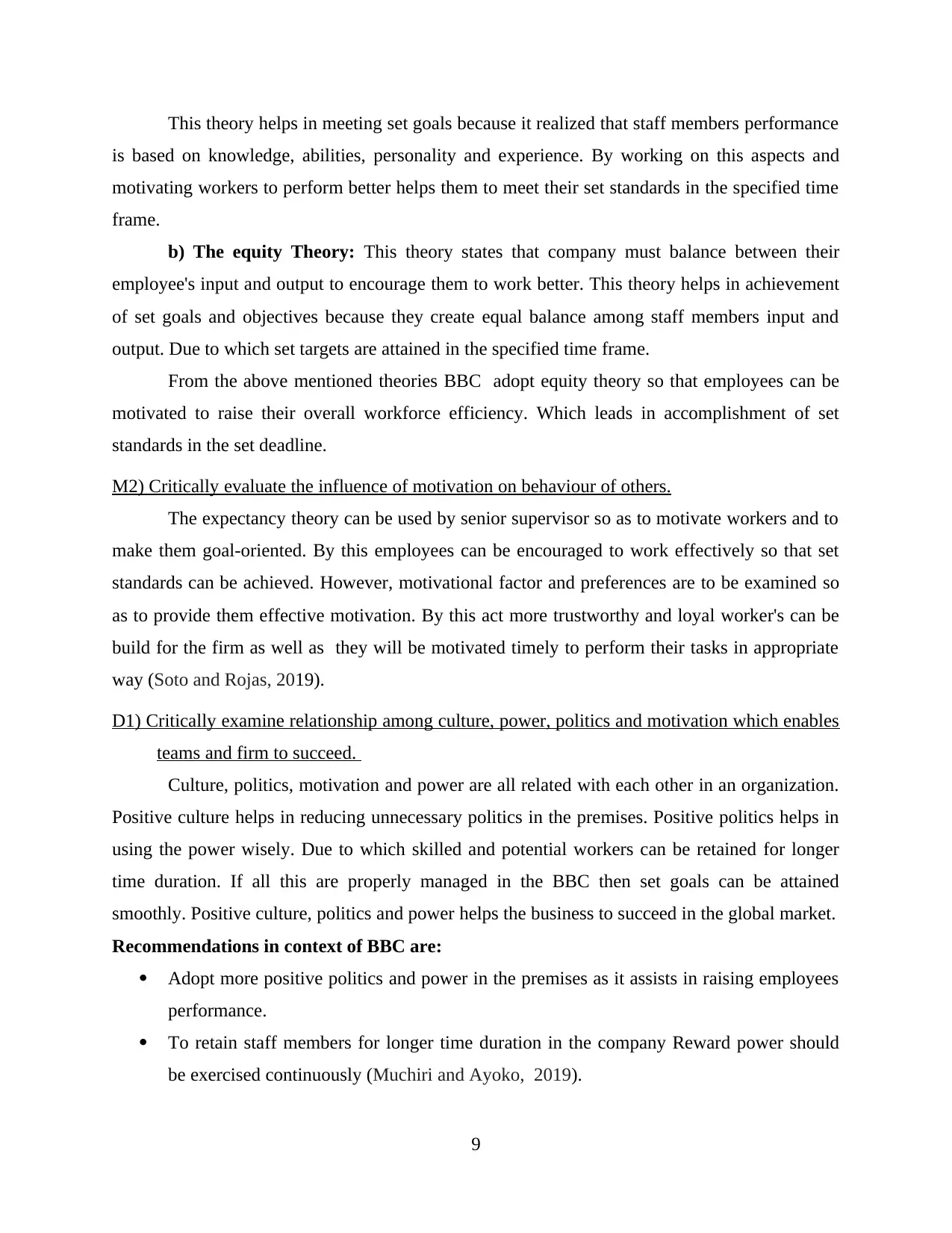
This theory helps in meeting set goals because it realized that staff members performance
is based on knowledge, abilities, personality and experience. By working on this aspects and
motivating workers to perform better helps them to meet their set standards in the specified time
frame.
b) The equity Theory: This theory states that company must balance between their
employee's input and output to encourage them to work better. This theory helps in achievement
of set goals and objectives because they create equal balance among staff members input and
output. Due to which set targets are attained in the specified time frame.
From the above mentioned theories BBC adopt equity theory so that employees can be
motivated to raise their overall workforce efficiency. Which leads in accomplishment of set
standards in the set deadline.
M2) Critically evaluate the influence of motivation on behaviour of others.
The expectancy theory can be used by senior supervisor so as to motivate workers and to
make them goal-oriented. By this employees can be encouraged to work effectively so that set
standards can be achieved. However, motivational factor and preferences are to be examined so
as to provide them effective motivation. By this act more trustworthy and loyal worker's can be
build for the firm as well as they will be motivated timely to perform their tasks in appropriate
way (Soto and Rojas, 2019).
D1) Critically examine relationship among culture, power, politics and motivation which enables
teams and firm to succeed.
Culture, politics, motivation and power are all related with each other in an organization.
Positive culture helps in reducing unnecessary politics in the premises. Positive politics helps in
using the power wisely. Due to which skilled and potential workers can be retained for longer
time duration. If all this are properly managed in the BBC then set goals can be attained
smoothly. Positive culture, politics and power helps the business to succeed in the global market.
Recommendations in context of BBC are:
Adopt more positive politics and power in the premises as it assists in raising employees
performance.
To retain staff members for longer time duration in the company Reward power should
be exercised continuously (Muchiri and Ayoko, 2019).
9
is based on knowledge, abilities, personality and experience. By working on this aspects and
motivating workers to perform better helps them to meet their set standards in the specified time
frame.
b) The equity Theory: This theory states that company must balance between their
employee's input and output to encourage them to work better. This theory helps in achievement
of set goals and objectives because they create equal balance among staff members input and
output. Due to which set targets are attained in the specified time frame.
From the above mentioned theories BBC adopt equity theory so that employees can be
motivated to raise their overall workforce efficiency. Which leads in accomplishment of set
standards in the set deadline.
M2) Critically evaluate the influence of motivation on behaviour of others.
The expectancy theory can be used by senior supervisor so as to motivate workers and to
make them goal-oriented. By this employees can be encouraged to work effectively so that set
standards can be achieved. However, motivational factor and preferences are to be examined so
as to provide them effective motivation. By this act more trustworthy and loyal worker's can be
build for the firm as well as they will be motivated timely to perform their tasks in appropriate
way (Soto and Rojas, 2019).
D1) Critically examine relationship among culture, power, politics and motivation which enables
teams and firm to succeed.
Culture, politics, motivation and power are all related with each other in an organization.
Positive culture helps in reducing unnecessary politics in the premises. Positive politics helps in
using the power wisely. Due to which skilled and potential workers can be retained for longer
time duration. If all this are properly managed in the BBC then set goals can be attained
smoothly. Positive culture, politics and power helps the business to succeed in the global market.
Recommendations in context of BBC are:
Adopt more positive politics and power in the premises as it assists in raising employees
performance.
To retain staff members for longer time duration in the company Reward power should
be exercised continuously (Muchiri and Ayoko, 2019).
9
⊘ This is a preview!⊘
Do you want full access?
Subscribe today to unlock all pages.

Trusted by 1+ million students worldwide
1 out of 20
Related Documents
Your All-in-One AI-Powered Toolkit for Academic Success.
+13062052269
info@desklib.com
Available 24*7 on WhatsApp / Email
![[object Object]](/_next/static/media/star-bottom.7253800d.svg)
Unlock your academic potential
Copyright © 2020–2026 A2Z Services. All Rights Reserved. Developed and managed by ZUCOL.




